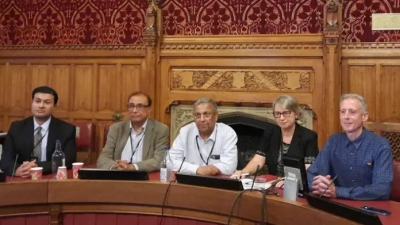By Rahul KumarNew Delhi, July 17: A number of Baloch activists gathered at the British Parliament on Tuesday to chalk out an international campaign to make Pakistan accountable for mounting a war on the people in Balochistan.The campaigners discussed strategies whether Pakistan’s civilian and military officials could be held accountable for the genocide against the Baloch community.
The discussion was organised by the Baloch Human Rights Council (BHRC) to address human rights violations by Pakistan in Balochistan province.It was hosted by Baroness Natalie Bennett, who promised to raise the matter in the British Parliament.
She said that there are enough ways to put pressure on the government in Pakistan internationally and in the United Nations.
Noted activist Peter Tatchell laid out a road map for focusing international attention on Balochistan.
He said that a UN-supervised ceasefire should be implemented in the strife-torn region under which “the Pakistani army is confined to the barracks” and the Baloch rebels also halt their activities.He also advocated for the release of all prisoners and the return of all Baloch refugees.
Tatchell said that Balochistan should be opened up to media, human rights organisations as well as aid agencies.He also said that international observers should be placed in the province till independence is achieved.
He said that these points should be shared with Pakistan and the international community should be urged to act upon these.
On how to make Pakistan accountable, Baroness Bennett said that blasphemy laws and the harassment of religious minorities in the country can be another way to pressurise Pakistan because it has become a sensitive issue with faith-based groups outside of Pakistan.
She added that people in the UK can ask the foreign office whether development aid to Pakistan has been spent on people or has been diverted towards non-community efforts.
Giving an overview of the situation in Balochistan, Dr Burzine K Waghmar from the School of Oriental and African Studies (SOAS) said that the signing of the China Pakistan Economic Corridor (CPEC) in April 2015, the Baloch community has been further deprived.
He highlighted that even though some of the Sustainable Development Goals (SDG) were supposed to be implemented through the CPEC, none of the development goals have been met.
Waghmar said that while land from the Baloch was taken for CPEC projects, the people have not been compensated.Similarly, the Baloch fishermen in Gwadar cannot fish in the Arabian Sea because of the Gwadar port, which is most likely to be a naval base with shelter for submarines.He added that even as Gwadar port has been leased to China for 40 years Balochistan itself will get only about 9 per cent of the revenue while the rest will go to China.
Activists said that Pakistan’s violation of human rights goes beyond Balochistan.Dr Lakhumal Luhana from the World Sindhi Congress said: “In 75 years since Pakistan occupied Balochistan, two things have remained cast-iron.The killings have not stopped since then.Also, the fight of the Baloch for their survival and for freedom also never stopped”.
He added that the tens of thousands of Baloch who have been murdered by the Pakistan State were the finest of Baloch people.
Luhana said that the reason why Balochistan and Sindh are under occupation of Pakistan is because 80 per cent of the wealth of the country comes from these two provinces which are geo-strategically important.
He said that all human rights conditions listed under the UN charter have been violated by Pakistan.
Giving a historical context to the Baloch issue, Dr Naseer Dashti from the BHRC said: “In the wake of the British withdrawal from India, the Baloch State, called the Khanate of Kalat, declared independence on June 11, 1947.In an agreement, called the “Standstill Agreement”, and signed on August 4, 1947, the future State of Pakistan recognised the Khanate as an independent sovereign State.However, after nine months, it invaded and annexed the newly independent Baloch State on March 27, 1948″.
Speaking about the “kill and dump policy” of the Pakistani military and spy agencies, Dashti said that the verified numbers of extrajudicially killed and missing persons during the last 17 years has crossed 15,000, adding that nearly a million people have been internally displaced.
(The content is being carried under an arrangement with indianarrative.com)
–indianarrative
#intl #Pakistan #Balochistan #Delhi #China #Delhi #New Delhi #Congress







